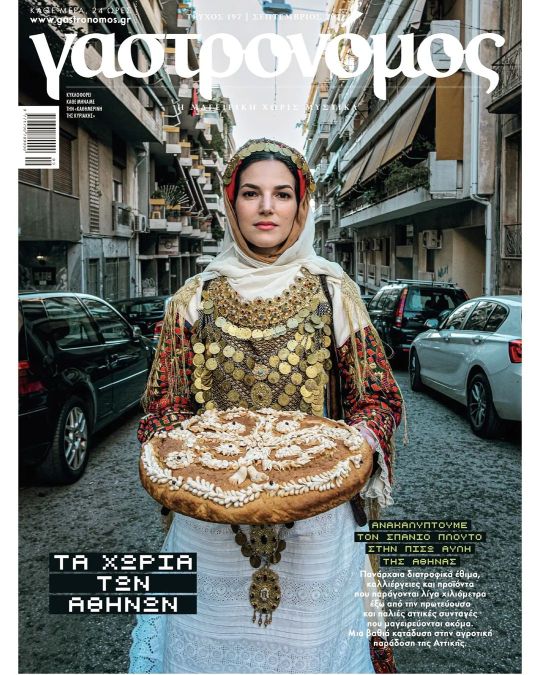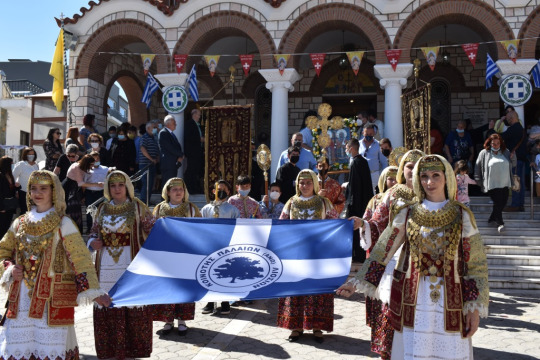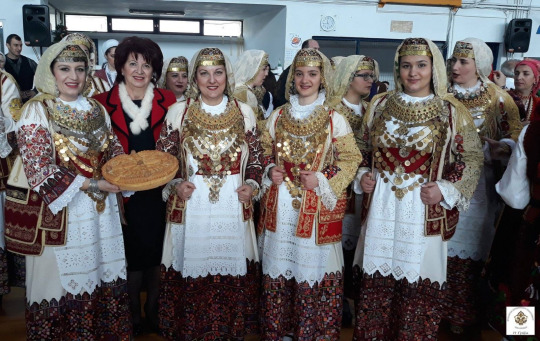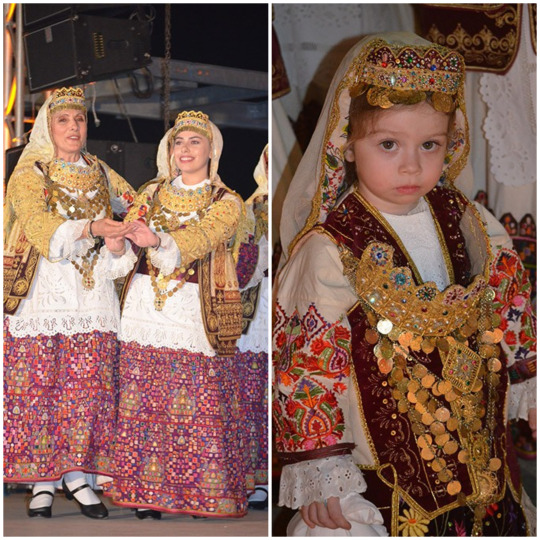#arvanite tradition
Photo

A cover photo from the Greek culinary magazine “Γαστρονόμος” (=Gastronome). featuring old traditional recipes from rural Attica. The photo was taken by Michael Pappas.
#greece#tradition#culture#traditional clothing#folk clothing#traditional dress#folk dress#historical fashion#arvanite clothing#food#pie#greek culture#greek cuisine#large
595 notes
·
View notes
Note
What really sucks is how, while many Greek Jews have been here for literally centuries, and even for the ones that came later on, still, our traditions are so heavily linked with the standard Greek traditions (Purim which is our Apokries, has been transferred for a long time, two weeks earlier and is celebrated during the Christian Apokries instead of the standard)and it sucks that people still claim that "jews are not truly Greeks" and how we don't belong here. Sadly I have been hearing that rhetoric even more lately to the point that I don't mention that I'm Jewish to people I don't know well, in case they are weirdos. And the way that the government is going (far right with the Spartans and everything) I don't see the situation getting better soon.
What's your opinion on this theitsa;
Hello! :) First of all, thank you for entrusting me with your thoughts! It means a lot!
It irks me when I hear "they don't belong here" about people who have been citizens of this country for a very long time! (it irks me regardless, but whatever) What the fuck "belong" even means?? And who the fuck decides that?? They are here, they are citizens, they are part of the Greek history, the end! Even more so if these people speak Greek, they have Greek education, they live the Greek reality every day, they fight for the same things as the rest of the Greeks, and so on.
It sucks that this country makes you feel like you have to hide, or explain yourself in case they learn you are Jewish. This shouldn't have to happen! And, to be fair, no one is 100% "pure" Greek (I hate the concept of purity but I mention it here for argument's sake). We all have at least ONE ancestor of Slavic (/Arvanite), German, Turk, Egyptian, Hebrew, Armenian, Persian etc descent. We don't live in a bubble! Markos Botsaris (+ his crew) and Laskarina Bouboulina were Arvanites!
For this reason, I think "How Greek" one is, shouldn't define how much respect they get as Greek citizens. We are all enclosed in the same borders under a common government and we will achieve shit if we give in to infighting about who is The Best.
At the same time, I don't mean to diminish your argument about Jewish Greeks having Greek cultural elements. It makes sense that Jews in Norway and Jews in Greece won't have the exact same culture, and that they will be affected by the culture around them. I imagine it's hurtful when this part of your identity is overlooked. I'm just saying that all people here are "allowed" to be here, since our law has allowed it.
I wish I could tell you "don't be afraid! go forth and be yourself!" but realistically you will be the judge of what's safer for you. At least from my perspective, most Greeks won't have an issue. They might be very interested, even. But one or two times there will be Greeks who will create an issue for you. And these bigoted Greeks might be even more than we think.
The "funny" thing about far-right parties like the Spartans is that, while they claim to be "for Greece", they seem to parrot USAmerican rhetoric (non-Greek rhetoric) which goes against how the locals historically viewed the Jews in Greece.
Correct me if I am wrong, anon, but I feel like the rise of antisemitism in our days is very connected to the US-Americanization of Greece? This type of antisemitism (the type of conspiracies) and the intensity is the exact same I see from people in the US who worry when Jews are in positions of power.
Now, it's a historical truth that certain Greeks worked with the Nazis for power, at the time Greece was under Nazi/Axis occupation. (The Greeks still hate these families that were Germanophille at the time, because these families also worked against the interests of the rest of Greeks) So antisemitic sentiments existed before. But the land of what is now Greece was under the Ottoman Empire for centuries and the Ottoman Empire was a haven for Jews who were heavily discriminated against and killed in West Europe.
Many Jews acquired power and influence in big Greek cities like Thessaloniki, owning factories, businesses, newspapers, and real estate. They were allowed to prosper and they were an important part of our societies. (The Byzantine Museum of Thessaloniki has an exhibition this year about the Thessalonian Jewish community. It's outside and left of the cafeteria, they have a new room)
At the same time, obviously, being Jewish didn't make you automatically rich and influential. Before the second world war, there were Greeks and Turks, and French who were very rich and influential, too. Traditionally the Greeks understood this was a Class thing, not an Ethnicity thing. (And, in any case, no people deserve a freaking genocide!!!) But my point is, in the Old Times I didn't see sentiments such as "oooo the Jews are here to control us!!" whereas I feel this is a big part of the Greek antisemitic rhetoric today.
The reason I think this sentiment is brought by the US is that in the US there are many Jewish communities and many have acquired wealth or they had generational wealth. But in Greece there as soooo few Jews and they don't hold the same amount of wealth. Like, the bigoted conspiracies of the far right don't even make sense in the Greek reality 😂
For those who don't know: Despite the efforts of Greek Jews to escape the holocaust and the efforts of many Greeks to help them escape in the Επαρχία (rest of the country, outside of Athens), like in Zakynthos, an extremely large number of Jews in Greece got killed by the Axis powers in the Second World War. Hence, the large Jewish population of Greece has dwindled, and the community is really small nowadays. The community (at least in Thessaloniki) is also cautious to open their culture to other Greeks because they fear antisemitic sentiments might hurt them again. (Which is understandable to me. Btw I heard this cause a friend writing her thesis needed access to the Hebrew records in Thessaloniki)
Sorry for the long response, anon! My thoughts were many, as you can see. I would be very happy if you could tell us more things about Greek Jewish culture, if you don't mind! (how it's similar or dissimilar to the more frequent version of Greek culture) I could not find many things online, or even in museums, about it and I am genuinely curious.
Feel free to correct me on historical stuff, if you have different info! I am sure we would all be better for learning it because so much culture and historical perspective was lost from the collective average Greek consciousness with the holocaust. I hate that this gap gave rise to the rhetoric of far-right parties. I would also like to be more equipped to speak against their antisemitism by knowing more facts.
I also wonder if it's any awkward celebrating Hanukkah as a Greek Jew? 😅 I think it's not awkward (because the Greek Seleucid Empire was a looong time ago), but I am really curious if the Greek Jews think some way about it.
#greek jewish#romaniote#<- anon might not identify with this but I'd like someone to also find this post while looking for Jews in Greece#so it's just for convenience purposes#answered
16 notes
·
View notes
Text
this is possibly the best analysis on this topic
youtube
everything he says is accurate.
some more input on Metaxas in the 40s, basically he was a dictator, that being said he was also leader during the occupation by the axis, so he’s forced westernization was probably a way to show the n*zis that “look we are not oriental and brown, we are western and white, maybe please stop killing us?”
but also could be just because he was a dictator, according to my grandmother he also banned flowers, and forced everyone who had pots or place to plant to plant veggies and fruits instead (that actually saved people from famine).
another thing my guy over there mentions in the video is about how he’s always mistaken for a greek in greece. that is accurate as fuck. my own brother from the same bloodline as me looks a lot like him actually, skin complexion, hairy as fuck (though my bro is already greying ahhaha ) while I look like I spawned from the netherlands or something, to the point people who don’t know me speak to me in english first before speaking greek even when they speak greek to the people I’m with.
as for the whole thing that some people try to shed their oriental roots from them and call themselves westerners, I have another example that happens in greece
I’m an arvanite greek, that means my actual roots are albanian, going back far enough and there is no difference in culture and phenotypes.
arvanites migrated to greece back in 1300s~1400s, after the ottoman occupation ended and because the arvanites played a big role in revolution, they were pretty much part of the greek population. sadly like with everything they assimilated so hard into the greek culture, that they shed theirs, their language (arvanitika which is an old albanian dialect) will soon be lost as the last people speaking it are at the end of their lives.
my great grandfather for example he was taught greek when he served in the military, his wife (great grandmother) was not speaking a word of greek, yet he forced her and all their relatives to speak greek, and his kids were never taught arvanitika, my father does speak some and understands a lot, but never pass down to the next gen, I only know some words nothing much.
youtube
this is an example of the language, the dancing and music, and the traditional outfits. most of the ladies singing are dead already and the language is lost with them.

this dress is my great grandmother’s it is pretty much the same as the ones the dancers in the videos wear.
now if you ask any greek arvanite if they are greek or albanian, they will first beat you then angrily tell you how dare you ask that when they are of course greeks.
if you ask any arvanite in the rest of the world if they are albanian they will most probably say yes.
personally, I id as arvanite, and as greek, I don’t id as albanian, but I do not deny the connection and the roots that the rest of arvanites here do.
0 notes
Photo

Albanesen 1871 (Albanian/Arvanite wedding probably in Attica)
51 notes
·
View notes
Photo

Σήμερα γιορτάζει ο παππούς μου! Ζήτω ο λεβέντης μας! Pappou Toli turns 97 today! in reality, he prob wasn’t born today but when he arrived to this land we are on now, he had to come up with a date of birth. The older generations didn’t celebrate bdays, only name days. The first step in his assimilation he had to process when he arrived in the States in the 1950s. He left a little spring fed mountain village called Negovani aka Flambouro. A village Rochester has to thank for their famous garbage plates and much more. Our diaspora helped craft this city and most won’t know. I was raised with him in my home. He hated when i watched Buffy the Vampire slayer and searched me out when he smelled nail polish and insisted it was “pollution” and did not want us wearing it. I struggled as a y2k tween with him in my home bc i wanted to hide my ancestral connections and not listen to his teachings then. He wanted to show me how to tend the garden, when to pick linden and how to collect seed. I barely paid attention and so much just didn’t absorb bc i was self absorbed with trying to be a teenager in suburbia. Today i am grateful i can listen now. He is the keeper of the medicine, of traditional music, language and land based traditions. He fought nazis and fascists in Greece and saw horrors we won’t ever tell. He loves animals. He raised animals and fields of food and medicine before he had to leave for a ‘better’ life here. He started Olympia Restaurant in 1978 and it still serves damn good greek diner food to this day. A Master of soups and stews. Tender of lemon trees. whistler supreme. Bouzouki player. supporter of Peoples movements and strong anti fascist ideology I’m grateful for him and hope he makes it to 100. He is the reason why i know plants and earth medicine. Today I will go harvest Λυπa aka φλαμούρι αka Linden for him. we spoke yesterday about a tree he would go harvest from and how the new landowners cut the old Linden down. He called them idiots. i agree. #παππουτολι #παππού #pappoumedicine #linden #flambouriote #arvanite #shqiptar #greekwasntourmothertongue #mygrandfatherisantifa #φλαμουρι #φλαμπουρο #φλωρινα https://www.instagram.com/p/CQyR0U0Nkyh/?utm_medium=tumblr
#παππουτολι#παππού#pappoumedicine#linden#flambouriote#arvanite#shqiptar#greekwasntourmothertongue#mygrandfatherisantifa#φλαμουρι#φλαμπουρο#φλωρινα
1 note
·
View note
Text
sensitivity reader
name: moira
pronouns: they/them
age: 18+
reads for: greek, part of the arvanitic minority, white, pansexual, gender fluid, raised orthodox but leaning towards paganism. grew up in rural greece, now living in athens. i have a good knowledge of traditions and agricultural activities. studying the classics, in case anyone needs help with the ancient world, and linguistics
sensitivity reading:
general questions and discussion: yes
in-depth discussion of plots and characters: yes
partial read (relevant sections): yes
full read: yes
willing to read: original work, fanfiction (avatar: the last airbender, all for the game - nora sakavic, the raven cycle - maggie stiefvater, fanfiction/stories based on greek mythology), erotica/nsfw/explicit scenes
unwilling to read: n/a
rates: fanfictions: 2€ (≈2,5$) per 1,000 words. original works: 3€ (≈3,5$) per 1,000 words. prices can be discussed for works over 5,000 words
contact: @heartsofsunlight, ghostofyou#2985 (discord), or [email protected]
2 notes
·
View notes
Photo


Albanian Dialects
GHEG DIALECT
Spoken in most of Albania north of the Shkumbin river, as well as in Kosovo, Montenegro, Serbia, most of the western part of the Republic of Macedonia, and Arbanasi near Zadar in Croatia.
Northern Gheg subdialect
Spoken in most Albanian-speaking regions north of the Mat river. These include Ulqin [Ulcinj], Kraja and Podgorica in Montenegro, the Shkodra region, Lezha, Malësia e Madhe, Dukagjin, Puka, Mirdita, Plava, Malësia e Gjakovës, Luma, Has, Kosovo and Presheva [Preševo].
Western variant: Spoken in regions to the west of a vertical line from the Montenegrin-Albanian border initially down the boundary between the Prefecture of Shkodra and the Prefecture of Kukës, including Theth and Shala in Dukagjin and areas west thereof such as Shkodra, Lezha, Malësia e Madhe and Montenegro.
Eastern variant: Spoken in regions to the east of a vertical line from the Montenegrin-Albanian border initially down the boundary between the Prefecture of Shkodra and the Prefecture of Kukës, including Nikaj-Merturi and Puka, and areas east thereof such as Gashi, Tropoja, Malësia e Gjakovës, Has, Kukës, Kosovo and Presheva.
Southern Gheg subdialect
Spoken in northern central Albania south of the Mat river and north of the Shkumbin river, including Mat, Lura, Peshkopia and most of western Macedonia (Dibra to Skopje and Kumanova), as well as Kruja, Tirana and Elbasan.
Central variant: Spoken in the interior basin of the Mat river, extending eastwards to and beyond the Black Drin river, including Mat, part of Mirdita, Lura, Luma, Peshkopia and western Macedonia (the left bank of the Black Drin around Struga, Dibra, Kërçova [Kičevo], Tetova, Gostivar, Skopje and Kumanova), as well as Kruja and Fushë Kruja.
Southern variant: Spoken in most of the coastal region from the mouth of the Mat or Ishëm rivers to the mouth of the Shkumbin river, including Durrës, Tirana, and Kavaja, as well as inland areas such as the Tirana mountain range, Martanesh and Çermenika, Elbasan and the valley of the Shkumbin river.
TRANSITIONAL FORMS
Spoken in a ten to twenty kilometre horizontal belt along the Shkumbin river valley, mostly on the left (south) side of the river, including the northern Myzeqe plain, Dumreja, Shpat, Polis and Qukës.
TOSK DIALECT
Spoken in most of Albania south of the Shkumbin river and into Greece, as well as in the traditional Albanian diaspora settlements in Italy, Greece, Bulgaria and the Ukraine.
Northern Tosk subdialect
Spoken in most of Albania south of the Shkumbin river, with the exception of southern coastal areas on the left (southwestern) side of the Vjosa river. On the coast, the southern border of this area is just south of the town of Vlora.
Western variant: Spoken in the regions of Myzeqeja, Mallakastra, Berat, Fier, Skrapar, Tepelena on right (eastern) side of Vjosa, Përmet and Vlora, including the area to the north and northeast of the town of Vlora.
Eastern variant: Spoken in the regions of Pogradec, Korça, Kolonja and Devoll, as well as the southwestern part of the Republic of Macedonia (the right bank of the Black Drin around Struga, Ohrid, Prespa and Monastir [Bitola]).
Southern Tosk subdialect
Spoken in coastal regions south of the town of Vlora and extending downinto Greece.
Lab variant: Spoken in the Laberia region, being Kurvelesh and Himara down to the Shalës and Pavlle rivers, including Delvina and Gjirokastra.
Cham variant: Spoken in the Albanian part of the Chameria [Çamëria] region south of Shalës and Pavlle rivers, and in the Greek part of Chameria sporadically down to Preveza.
Arvanitic Tosk subdialect
Spoken traditionally in about 300 villages of central Greece, in particular in Attica, Boeotia, southern Euboia, the northeastern Peloponnese around Corinth, the islands of the Sardonic Gulf, including Salamis, northern Andros, as well as some other parts of the Peloponnese and Phthiotis. This archaic dialect is moribund, though there may still be from 50,000 to 250,000 speakers, mostly older people.
Italo-Albanian Tosk subdialect
This archaic variant of Albanian is spoken by about 90,000 people in southern Italy. Speakers are to be found, usually in remote mountain villages, in the regions of Calabria, Molise, Puglia, Basilicata, Campagnia, Abruzzi and Sicily.
240 notes
·
View notes
Note
Hello! I would like to ask if you know or have any pictures of folk costume from the Fyli municipilaty, specifically Ano Liosia. If not that, just different stuff from north-western part of Attica ;^^
We're mostly talking about those regions with the exquisite Arvanite folk clothing, right?
Fyli or Phyle is a municipality that encompasses the regions of Phyle, Ano Liosia and Zephyri. It is a suburb of Athens in West / Northwest Attica.
Fyli has two main cultural associations, I believe, Ghriza and Phylasia, and the photos I found are from their participation in various events and festivals.
The women in folk clothes of Ano Liosia are traditionally called γριζοφόρες (ghrizophores) and their attire is called γρίζα (ghriza).

From Fyli municipality's archive.

From evima.gr.

From doxthi.gr.
Just gorgeous!
#greece#traditional clothing#folk clothing#cultural clothing#historical fashion#fashion#culture#arvanite clothing#ano liosia#fyli#phyle#athens#attica#sterea hellas#central greece#mainland#arvanite tradition#greek culture#anon#ask
40 notes
·
View notes